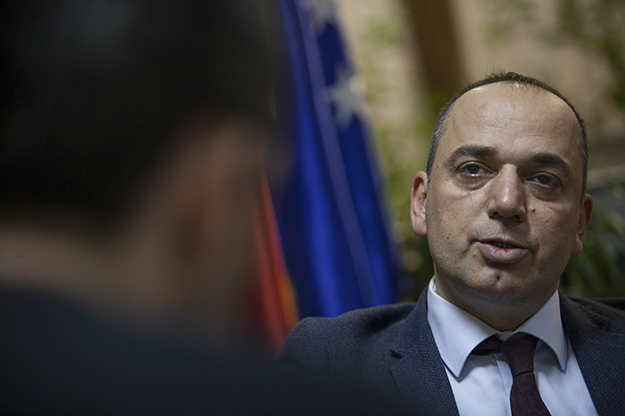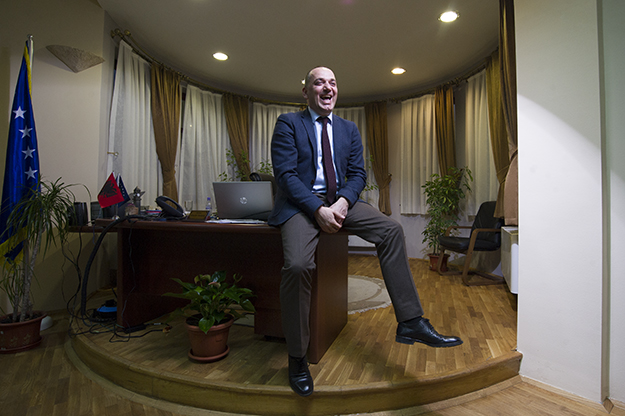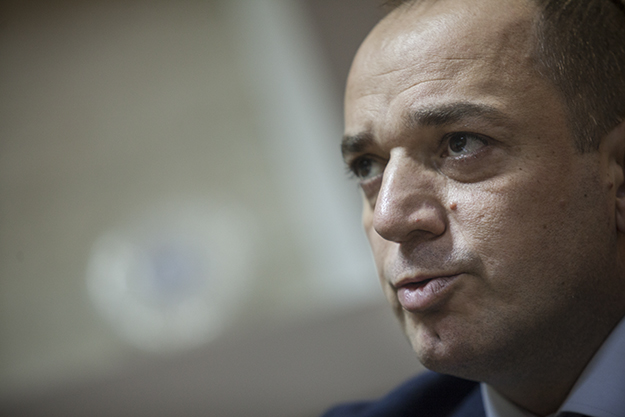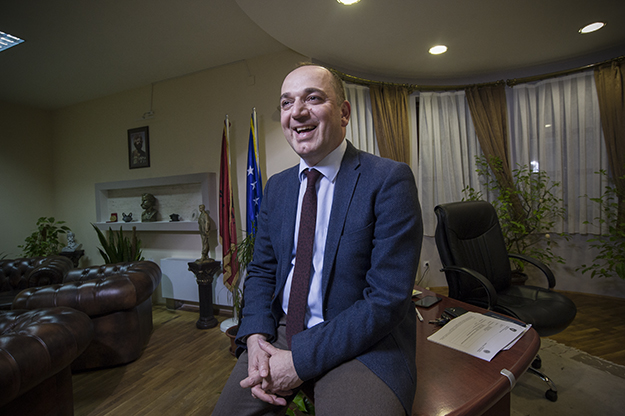Prizren’s new mayor, Mytaher Haskuka, achieved the most impressive turnaround from round one to the run-off in October 2017’s mayoral elections. With 5,000 votes less than PDK’s Shaqir Totaj in the first round, the Vetëvendosje candidate produced an electoral earthquake, bringing to an end a decade of PDK domination in Kosovo’s second largest city.
When he took over the premiership in the historic city two months ago, Haskuka had already started to define many obstacles, mostly coming from the previous government. However, he insists he is committed to continuing his job and fulfilling the promises that he made in the electoral campaign.
The 44-year-old emphasizes that despite difficulties and the past roles of some individuals in previous administrations, his coalition partners LDK and NISMA have started to adjust to his new culture of governing.
For the university professor of psychology, politics remains a temporary activity, an effort to bring some change before getting back to his professional job.
In a wide-ranging interview with K2.0, Haskuka discusses the cultural diversity of Prizren, the concrete steps that he has taken in his first two months, the municipality’s support for the city of Prizren and its surrounding villages, and his perspective on his upcoming four-year term as mayor.

Photo: Majlinda Hoxha / K2.0.
K2.0: You started your mandate two months ago. What new challenges and issues do you face now? How did you see the situation two months ago?
Mytaher Haskuka: Regarding issues that face the municipality, I never expected things to be easy. We often said ‘what if we win?’ [laughs]. We knew that it would be difficult, but we didn’t expect certain difficulties. This municipality has existed since 1999 in terms of local governance. Our country is 10 years old, so I thought that the municipality would have institutional memory.
By saying institutional memory, I mean being informed about projects that were initiated by the previous government — where the projects stand, what work was done, how things went, and what needs to be done. But there are big problems here.
Although we transferred responsibilities, materials, data, the archive, the situation is still very problematic. The municipality of Prizren did not electronically file agreements and projects that it made with different organizations. For example, we’ve had a case in which an NGO approached us saying: ‘We had an agreement with the municipality. This was the figure. You have only paid this much so you must now pay the rest.’
Two months in, what fears, or even skepticism, do you have about the end of your mandate?
Expectations are high. In general, the citizens have a lot of unrealistic expectations. In the first two months we have held meetings with at least 2,000 people. Currently I have a list of 100 requests for meetings — some are from NGOs, others from businesses, citizens, activists.
Most of them have direct concerns which they think can be solved immediately now that the door is open to them. But, on the other hand, we also have issues with the budget and its limitations. The more I meet people, the more requests I receive. So my fears are related to the management of my time and these requests.
One of the things that has demoralized me in the first two months is the number of people who have sought employment. I never promised employment to anyone during my campaign. The municipality does not employ people. Some insisted that I made such promises, but I didn’t make them.
A mayor cannot be an employer, but in our national politics a perception has been created that the municipality is a place of employment. I told them that this is not right, because I cannot employ people. I also told them that they should apply when we have open calls, because I will ensure transparency and equal treatment.
Another issue which you have inherited from the past government and addressed recently is the high number of lawsuits filed against the municipality, which could total up to 50 million euros — more than the budget of Prizren. How do you see this?
This is a big issue. We knew that the municipality had issues with many individuals, but I never expected 3,700 lawsuits against the municipality. Even if we look at the total, the figure could reach 50 million euros. Just one of those lawsuits is for 9 million euros. If the municipality loses the case in court, it will have to pay.
You had some priorities in your program. Does this perceived situation present an obstacle in fulfilling your promises and working towards the priorities which you set during your campaign?
We will continue to work towards our priorities. The main objective was to open up the municipality, to have it be open to the citizens, to inform them about what is done in the municipality and to have radical transparency.
A municipality that has qualitative education and healthcare sectors. A municipality which citizens can have access to. An open city in terms of infrastructure. A municipality that is economically developed. These are our priorities, but we see that we will need to work more and spend more energy to reach certain objectives.
Usually in transitions from one government to another we hear complaints about inherited debts and obstacles which prevent the fulfillment of future objectives. Could this be a justification for not reaching goals?
No. I will achieve my objectives during the four year mandate. I think that I will fulfill 95 percent of the promises that I made. Naturally it will be hard to fulfill all of them. But the key issue is that despite the challenges, I think that I will fulfill most of them.
To reach your objectives, you obviously need to have the support of your coalition partners: Nisma, LDK, and the smaller Bosnian and Turkish parties. LDK has co-governed in Prizren in the past. Current Nisma members were also part of previous governments as part of PDK. So what do you say to the critics who skeptically perceive your co-governance with exponents from previous governments? And how do you ensure a different government when you are working with people that, according to you, ‘degraded’ Prizren?
I think that a person is not born good or bad. I believe in myself, so I formed a coalition partnership with other parties. I think that we can achieve change faster when we are united. It is more difficult to achieve change individually than collectively. Unfortunately in Prizren, even the parties that were in opposition made different agreements about different issues that have degraded the city.
"As mayor, I need to delegate tasks and periodically check whether or not things are going as planned. Naturally, there will be some criticism."
But now we must also consider the positive sides. I think that my coalition partners and I have appointed the best people in different departments. One of my demands was to have more gender representation in our government, and we did not achieve this. But I want to have more women in the cabinet.
However, the key issue is that we now have work plans for each directorate. They all have their plans and objectives that they must achieve within the first year. I will seek accountability from everyone, no exceptions.
Have your coalition partners shown willingness to adapt to your governance model?
I think this is the main objective: to work together. Naturally, in terms of approach and culture of governance, it takes time. We are setting the conditions but we cannot control 100 percent of it. As mayor, I need to delegate tasks and periodically check whether or not things are going as planned.
Naturally, there will be some criticism. I want citizens to be critical, to seek quality, to seek more, but at the same time, not to be unrealistic. Of course I need to trust the people I work with, but I also need to keep them in check. When they see that you do not give in and are on the right track, they adapt.
Can you give us a concrete example of how you imposed a different culture of governance on your coalition partners?
OK, I will not give names, but I will take one example. I demanded that the inspectorate implement the law properly and the inspectorate stopped construction work that was being done without a permit in some parts of the city. One of my coalition partners came to me and said ‘he helped us during the campaign,’ and I told him that it made no difference because he went beyond the permit.
I do not give in in such cases. I would act the same even if it were against my brother. That is the logic of equal governance. With processes, we will have standard operation processes in all directorates. This way we will enable the depoliticization of the system. We will make an open system of decision-making.
What kind of relations do you have with the opposition, PDK?
PDK is the biggest party in Prizren and as such it must be responsible. In government, they were not responsible, but I hope they will change this approach now that they are in opposition.
To illustrate this, the computer at the mayor’s office doesn’t work. The furniture and facades are beautiful, but the computer doesn’t work. The situation is not good. The computer is a tool of work, not a luxury. Our cars were produced in 2017, whereas the computer, which is a basic thing, was produced in 2006 and does not work anymore. This illustrates their mentality of government, and this must change.

Photo: Majlinda Hoxha / K2.0.
Moving on from your discord with PDK, Lëvizja Vetëvendosje has experienced an internal split at the central level. How much did these problems exacerbate the situation at the local level?
Vetëvendosje’s problems in Prishtina were not spread to Prizren on a large scale. We did not have big issues here, but it is still something that had a negative impact. The fact that we have such problems within the party has a bad effect on people’s morale, their motivation for work, but also the general perception of Vetëvendosje.
You cannot achieve change when you have a fragmented structure. This presents a problem, but up until now we have managed all these disagreements within Vetëvendosje. We have to work much more with people, with our assembly members.
I have taken a position in this debate. I did not agree with the idea of giving Albin Kurti the condition not to run for the head of the party. It seemed unjust to me. If someone believes that they are better, they should run for the position. These are processes that we have in Vetëvendosje and I feel that we should continue to implement democratic procedures.
Going back to Prizren: in addition to being elected mayor of Prizren, recently you were also elected as a member of the central headship of Vetëvendosje and you are also a professor at the University of Prishtina in the Psychology department. Vetëvendosje has continuously criticized politicians who hold many positions while serving political functions. How do you manage your time as mayor of Prizren, member of the general headship of Vetëvendosje and a university professor? And how do you comment on the fact that you have criticized such a model of political action in the past?
Firstly, the work that I do as a member of the headship does not constitute a position. We meet once a month so I do not see it as something problematic. In fact, I raised this issue once but they insisted that it would not take up much of my time, so I accepted the offer. If they had said to me that we would meet weekly, then I would not have accepted it. But since it is only one or two hours per month, it does not present a problem.
As a professor, I spoke to the department and asked to resign. But due to issues that the department has with accreditations, I am still there. I requested to change my position but they wanted to keep me for working with master’s degrees since students need professors that oversee their master’s theses. I can say that this does not take up a lot of my time.
"I promised that every neighborhood in the city and every village would have access to running water, but this cannot be achieved in two months."
Moreover, even when I was a deputy, I only had one subject in one semester, and now that I am mayor, I will delegate this to assistant professors. I transferred the lectures. So my work in the university was to oversee master’s theses. Most of the work I do is mentoring, and this does not present a problem for me because I read them and comment on them in my free time. Also, if everyone uses this freedom that is offered by the law, I do not see why it would be problematic to continue to monitor master’s theses.
But it is also a moral issue that Vetëvendosje has continuously highlighted: you cannot have more than one job when we have so many unemployed graduates. We are not only considering the legal aspect. Shouldn’t you be an example in this regard?
Listen, there are two things here. Firstly, whether or not you are doing the work in the right manner, and secondly, good time management. If I notice that it is becoming an obstacle for the municipality, I will resign as a professor. But I’ve seen that mentoring students does not take up a lot of my time, so I continue to do it. I do it on weekends and it is a job.
It is a valid question, but the key here is whether or not it damages me in terms of my work. I assure you that in these first two months I am always at the office until 7 or 8 in the evening.
Let’s move on to your plans for linking the economy of Prizren’s villages, which are known for agriculture and farming, with the city’s economy. Activists and citizens say that the two are not connected. Serbian and Turkish products dominate the Prizren market. Vetëvendosje included the promotion of local produce in their program. I know that you were planning on building six mobile markets in different neighborhoods in the city. Do you have a concrete plan for changing this flow and bringing products of the villages to the city?
Enabling access to agriculture markets was one of my campaign pledges. There are two options. One bigger market in the city and smaller markets in neighborhoods. We are currently working on both. We also held meetings with CARITAS [a humanitarian aid, international development and social service confederation] and TIKA [a Turkish cooperation and coordination state agency] for exporting our produce. CARITAS and TIKA are especially interested to help transport forest fruits, and we sought opportunities for creating an external market for our farmers, in addition to the internal one.
We reached an agreement with CARITAS: the municipality will give 200,000 euros, and CARITAS will give 2 million euros, to create more spaces for producing small forest fruits that have an added value in the economy. I believe that we need to increase the capacity and help Prizren’s farmers.

Photo: Majlinda Hoxha / K2.0.
What other policies do you have for Prizren’s villages? According to the Central Election Commission, you won votes in the city, whereas the villages tended to vote for PDK…
My first decision as mayor was to repair the roof of an elementary school in Lubishtë e Hasit. It cost 18,000 euros and it was finished two weeks ago. In one month we fixed something that was left unfixed for a year. So this issue is not relevant and all citizens are equal. The first three or four decisions were related to Prizren’s villages. In fact, both the city and the villages comprise the municipality of Prizren, so for me they are no different. We will intervene wherever necessary.
Sometimes citizens are unrealistic. I have been serving as mayor for two months and they want to fix the water supply issue immediately. I promised that every neighborhood in the city and every village would have access to running water, but this cannot be achieved in two months. There are people who say ‘Ah, Vetëvendosje won it so they will fix the water issue in two months.’
Nevertheless, maybe you made unrealistic promises. To mention one: you said that you would functionalize Prizren’s economic park within six months. In what stage are you now, four months away from the deadline?
We are working on it. In terms of infrastructure, we have prepared everything. Last week I met with KEDS to secure electricity supply in the economic zone without municipality funds. There is willingness for direct investment. We have delegated other work — such as drainage, the sewage system, road reconstruction etc. — through tenders. But today we realized that we are faced with another issue: Most of the property belongs to the government, not the municipality.
You did not conduct research prior to making this promise?
We referred to information given in the media and the municipality’s website.
So it turns out that the economic zone cannot be completed because of these issues?
It could possibly take more than six months because we need to obtain ownership of the property so as to create conditions for those that want to invest in the economic zone.
Another question, one with an ethnic character. Prizren is known as a center in which different communities coexist. Lately you were vocal when the Turkish flag was removed. You were even branded ‘a Turk’ during the campaign. How do you see this? What does it mean to be the mayor of Prizren from this angle?
To tell you the truth, I love Prizren as it is. I have entered politics because Prizren has been degraded, not only in the aspect of culture and architectural heritage, but also of the city’s values. This is why I have entered politics. At the office I speak Bosnian, Turkish, Albanian, English. I have tried to speak as directly as possible to anyone that has visited me. That is the way of Prizren.
"I cannot assure them because it is an issue. It is hard to stop the destruction."
Prizren has always been a city in which people did not judge one another based on ethnicity, but rather on kindness, honesty, work ethic. Older generations never took ethnicity into account. I believe we must further this tradition. This ethnic and religious coexistence is something that makes Prizren unique.
Besides cultural heritage, historic sites have also been degraded in Prizren. What concrete steps did you take to prevent such a practice?
Before I started my work as mayor, an old house with cultural heritage was destroyed. I immediately called the director of the inspectorate, who was a PDK member, and asked him to explain what had happened. He told me that he was no longer competent. The new cabinet members went to the inspectorate and sent a record to the police and court. We demanded that concrete steps be taken against those responsible.
Do you assure the people of Prizren that no more cultural heritage sites will be destroyed?
I cannot assure them because it is an issue. It is hard to stop the destruction. First they light it on fire, they let it wreak havoc and in the end only the walls are left, so the excavators destroy everything. You can stop illegal construction, because it has a long term character, but it is hard to stop the destruction.
The previous government often faced problems with the artistic community. What relations have you created with the people of culture?
Even during the campaign I met with the network of cultural organizations in Prizren, to compile the plan and pledges for culture. They gave their input about a part of the situation and we compiled the plan together. After I became mayor, we met again to discuss the next steps. For example, cultural organizations are helping me create the rules for subsidies for sports and culture.
So my office is open to them. I want to help them solve their problems. For example, we immediately signed an agreement with DokuFest. The festival and the education directorate decided to organize DokuFest events in schools, to teach children through documentary films. They will screen different films about social issues. So we are putting into practice the things that we discussed with them before.

Photo: Majlinda Hoxha / K2.0.
You also promised to reduce road traffic. What are the concrete steps you have taken in this regard? When will the new parking lots which you pledged to open be finished and ready to use?
Firstly, we are preparing to conduct an analysis of city mobility. When we do this, we will see the alternatives. One of the preliminary ideas is to have public transport be free within the center. This would reduce traffic within the center. People could leave their cars in parking lots in the suburbs and have then utilize the free public transport system in the center.
While we are on the subject of civil mobility, there is also a project for building a cable car system which would enable easier access to the fortress. It has a cost of 3.5 million euros and is financed mainly by the Kosovo Government, and partially by the Municipality of Prizren. Have you terminated this project?
We are currently in the process of terminating the project. I have said throughout my campaign that without conducting a good analysis, it would be damaging.
Why? For example, it can benefit people with disabilities.
We have alternatives which we will propose. For example, transport can be organized from the area underneath the fortress, on the road. We could have buses or mini-buses which travel two or three times a day. The issue with the cable car system is that no permit was obtained from either the Regional Center of Cultural Heritage, the Council for Cultural Heritage or the Ministry of Culture — they only obtained an urbanization permit.
"If I am not able to achieve most of my objectives, I will not run."
We will prevent the damage. The cable car system would destroy Prizren’s historical center. It would create an object which is out of context — architecture from the ’70s or ’80s. The station at the fortress is foreseen to have facilities to accommodate 200 people. It would be like a wedding hall! I think it would ruin the image of the city, so it must be stopped.
In education, you have presented the model of school lunches and new kindergartens, similar to the one implemented by Shpend Ahmeti in Prishtina. Are you still following this plan?
We pledged to build four kindergartens. This year we will start to construct two or maybe even three of them. We will start implementing the school lunch program at the end of the year or in January 2019. We are also interested in supplying schools with different laboratories, cabinets and other inventories. The municipality of Prizren has no public kindergartens. We think the best formula for new kindergartens is based on communities.
If you fail to reach these objectives, would you run for another mandate?
If I am not able to achieve most of my objectives, I will not run. Anyway I have never thought of myself as a mayor, but circumstances brought this on. I don’t think that I have ambitions to continue in politics. I am in politics only to bring change. When I am done, I will work in other fields as a professional. I don’t think that politicians should be in politics constantly. This is not a good idea. Every person should enter politics to change something and then go on with their life working in their profession.K
This conversation has been edited for length and clarity. The interview was conducted in Albanian.
Feature image: Majlinda Hoxha





